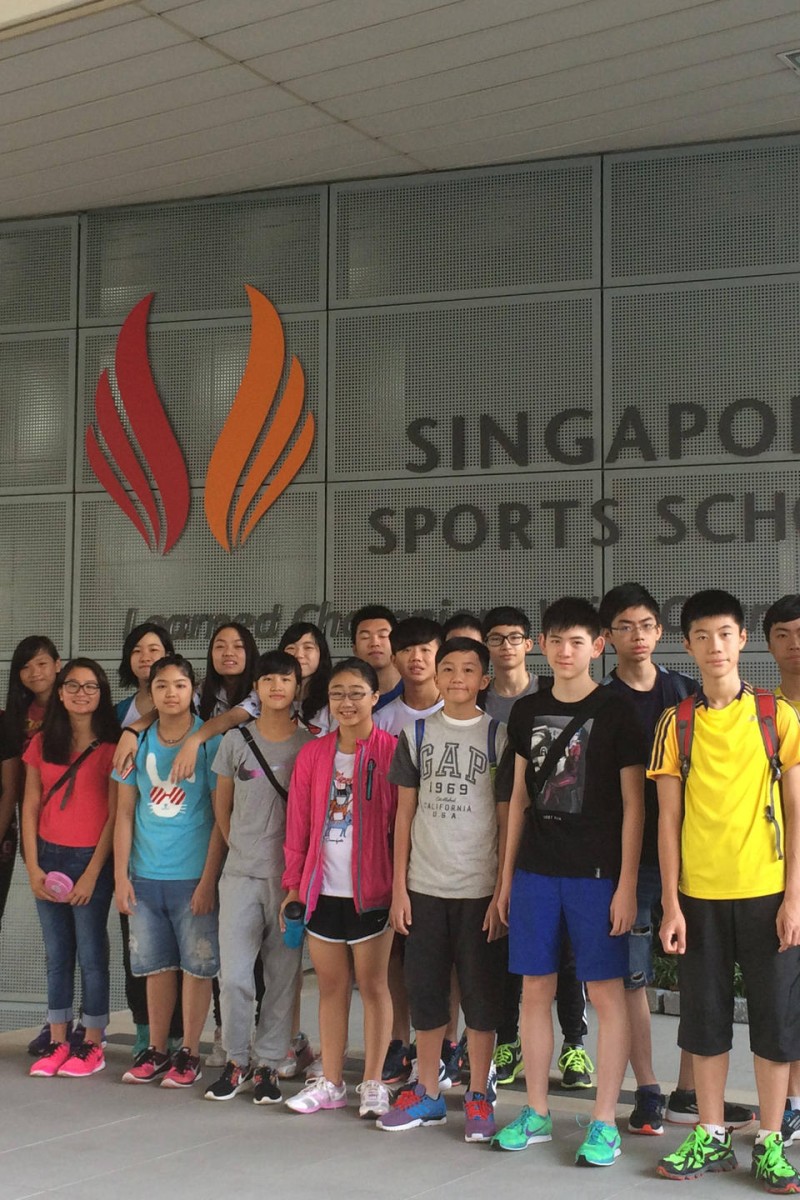
Top fencers and swimmers from Lam Tai Fai College talk about their recently completed cross-cultural training programme at the Singapore Sports School
 There was plenty of competition among the local students in Singapore, but team spirit was high.
There was plenty of competition among the local students in Singapore, but team spirit was high.When you're among the top student athletes in Hong Kong, it's easy to lose your drive. So when a team of fencers and swimmers from Lam Tai Fai College spent a week training with students at the Singapore Sports School this summer, they realised they had a lot to learn from their Singaporean counterparts.
Swimmers get stronger
Swimmer Katie Chui Kei-yee, who ranked eighth in Hong Kong for the 200-metre breaststroke in last year's Age Group Short Course Swimming Championships, found that she was taking too much time warming up. In Hong Kong, she usually has an hour to do warm-ups and presets to get her body ready for the main training.
But in Singapore, she had to do the main sets soon after stretching.
"When you compete you just have about 45 minutes to warm up, so our performance isn't as great as it could be," says the Form Five student. "The method in Singapore helps train our bodies to get into peak condition in less time."
The morning sessions took place in the 50m pool, where they swam about 2,000m. The body's reflexes are slower in the morning, so it's the best time for power training.
Afternoon sessions stressed aerobic and endurance training. "The body gets tired in the afternoon, so it's the perfect time for endurance training," says Katie. "Training aerobically is crucial because the milliseconds you gain could be the difference between winning and losing a 50m race."
They typically swam 6,000m in the afternoon, but one time the coach made them do a gruelling 7,000m within two hours.
The experience turned out to be Katie's favourite from the entire trip, because the whole team managed to finish it by encouraging one another. For Katie, who usually trains three hours a day from Mondays to Saturdays, it was a huge attitude adjustment. "I thought I was training enough, but clearly not. And sometimes I don't train seriously when I think I'm tired," she says.
"My biggest obstacle is really myself."
Fine work from fencers
Form Three fencer Apple Chu Wing-Kiu, who is part of the Hong Kong national fencing team, says her training in Hong Kong doesn't focus enough on physical conditioning. "We would compete with the Singaporean students in our afternoon training sessions, and I'd be panting hard after a round of 15 points. But the local students could go through two to three rounds effortlessly," she says.
Twice a week, Singaporean student fencers spend their mornings in the gym, training on treadmills and bikes. They also have a tough core-muscle training programme, which Apple found most challenging. While she just did one-minute planks in Hong Kong, their Singaporean coach made them do it with just one hand and added leg movements.
"The students never complained, whatever programme their trainer gave them. They're also really disciplined and arrive early to warm up by themselves," she says.
Apple has been doing additional conditioning exercises at home since she came back from Singapore, and she says her endurance has already improved. "There's no free lunch, so you've gotta work hard to get the results you want."
While the Hong Kong students got to rest between breakfast and lunch, the Singaporean students had to attend class. With only five hours of lessons a day, they have to be extra disciplined to keep up.
"They made me realise it was possible to balance training and studying. I'm working harder now. No more excuses for not doing homework because I'm too tired," says Apple, who hopes to compete in the Olympics. "We have the same goals, but they're working a lot harder to make it happen."
Daily schedule:
6.30am-7.30am training
8am-9am breakfast
9am-12pm Lessons (Singapore students)/rest (HK students)
12pm-1pm Lunch
1pm-4pm Lessons and study sessions (Singapore students)/project work (HK students)
4pm-6pm Afternoon training
6pm-7pm Dinner
7pm-9pm Reflection writing
9pm-10pm Free time
10pm Bed